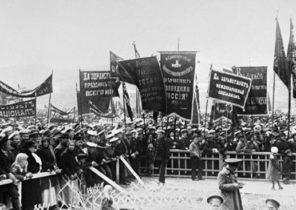
7 Feb employees of one of the largest supermarkets in Georgia network Fresco published in the Facebook statement, claiming that the work in “exploitative conditions”. Two days later, employees of Georgia’s largest network of bookstores “Biblus” went on a similar step, putting the message. Both statements received wide publicity and was accompanied by protests outside stores around Tbilisi.
These protests, as well as broad support from the citizens of the country indicate the possibility of major changes in this still quiet sector, said Lina Gvinianidze, Director of social rights at the Centre of human rights education and monitoring.
Two years ago, two employees of another supermarket — Ioli — also expressed protest regarding the working conditions, but “except for a few protests after their dismissal, nothing has changed,” she said. This time the statements of [the two employees of retailers] is not only a census of hundreds of thousands of times on the Internet, but other people also began to talk about their working conditions in the service sector, and are now held several protests”.
In recent years Georgia has had a growth of workers ‘ protests. In particular, last year in the West of the country there was a strike of miners. But, according to Gvinianidze, representatives of the service sector, the largest sector of the Georgian economy and plays a major role in society, do not have their own Union.
The administration of the retailers denied the protesters ‘ allegations. Chief Executive officer Fresco said that statements were made by people who are not employees of Fresco, and so untrue. “Biblos” in response wrote a long statement, claiming that the workers are silent about the important details and that the company treats its employees.
But after the online application became viral, hundreds of ordinary residents of Georgia, faced with similar problems in the service sector, began to share their stories by posting them with hashtag #გაბედეშენც (“don’t be afraid to speak out”).
For example, a Facebook user wrote that her Manager deducted 50 lari (about $ 19) of her salary is 350 lari ($135) because it is two minutes distracted from work when she was told the bad news. “Bend down to tie shoelaces, to sit, to talk with colleagues — it was all forbidden under the terms of the contract,” she said.
Observers attribute the growth of protest moods among the workers with the policy. Under the previous government, under the leadership of President Mikheil Saakashvili’s government canceled the series protecting workers ‘ legal rules facilitating the dismissal of workers, reducing contributions to the pension Fund and repealing various benefits.
One of the most notable reforms was the closure of the Department of labour inspection, whose duties included the enforcement by employers of labour legislation. The Department was abolished under the slogan of struggle against corruption and bureaucracy, and stimulate economic growth, but as a result, workers are left without protection.
“In Georgia there were many corrupt agencies, including the police, education system, — said Gvinianidze. But the difference is that [Saakashvili’s government] decided to transform these agencies. And the Department of inspection of labor just closed, creates nothing in return.”
“The deregulation of labour rights under the previous administration really had a negative impact on all industries, — said Gocha Alexandria, Deputy Chairman of the United trade unions of Georgia, the largest trade Union Confederation in the country. They killed in Georgia workers ‘movement”.
The coalition “Georgian dream” in 2012 wrest power in Parliament from Saakashvili-led United national movement, has promised voters to improve social conditions. In 2013, the government returned some of the protection mechanisms for the rights of workers, including the Department of inspection of labour.
But hopes for a significant improvement under the new government proved illusory, and by the end of 2013, the workers realized that “cannot expect that the authorities will punish employers,” — said Gocha. Became more frequent the protests of the workers, including numerous appearances miners over the past five years.
Gvinianidze expressed the view that organized workers in the retail sector protests change the attitude of the people of Georgia to labour rights. “The current performance of service workers clearly showed the public that the issues of labor rights affect us all, not just miners, for example,” she said.
Gocha agreed Gvinianidze, noting that the social network has helped to attract more attention to the bad conditions in which every day have to work in the service industry.
The government has not yet made any statement on the recent protests. But there is reason to believe that they have increased the urgency of the problem of working conditions for the Georgian society, which could potentially attract the attention of politicians.
“Every month I work 8:30 to 23:30 two weeks in a row, and then I’m free for two weeks, said Tamuna, working in a small shop in the center of Tbilisi for the past 10 years. — I never thought that this is a violation of my rights, but perhaps I should try also to improve my working conditions”.







